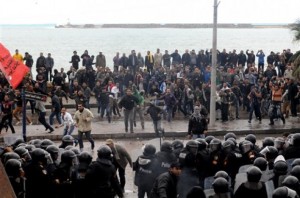
Article pubilished in openDemocracy
The 25 January 2011 revolution is nearly two years old, and with every anniversary reflection sets in, and so do the cynical questions thrown at me: “What has the revolution achieved?” and “It brought extremists to power”. It’s as compelling as the French asking themselves the same question in 1791, two years after the start of their bloody revolution. Yet I would be wary to compare Egypt to the bloody track record of the historical titan of revolutions or even to the current mess in Syria. Egypt, for all its faults, is not a country with a history of mass graves.
An insight dawned on me on a train journey from Alexandria to Cairo on the eve of the first anniversary of the revolution, heading to join my friends at Tahrir Square. In my carriage, were about a dozen and a half soldiers who had been recalled from the coastal city to secure parts of Cairo in anticipation of anniversary violence. Sitting next to me was the most senior army officer in that carriage and it had to be one of the most uncomfortable trips in the heated anti-SCAF (Supreme Council of the Armed Forces) days – my head sporting a beret next to his military cap could not have struck a more vivid contrast. You can imagine I felt awkward, surrounded by soldiers uttering statements like “If it wasn’t for us, the revolution would be dead.” Those ungrateful Egyptians.
In the final fifteen minutes of the journey, I decided to strike up a conversation with the officer. It was a cordial discussion until I asked, “That Tahrir girl who was beaten up by the army last month and her blue bra exposed..” before I could finish, he raised his voice, “That was a lie, do you ever see us wearing running shoes?” and he threw in the stock-in-trade conspiracies surrounding that incident. It was then that many officers came in to listen to the conversation of their commander but did not utter a word in deference to the chain of command. At that moment, I realised something: could I have even dreamed before the revolution of openly posing such a question to an official who, in a different era, might have had me arrested? It all comes down to what defines the post-revolutionary Egyptian public psyche – the vanquishing of fearthat remains the strongest bulwark against the counter-revolution. It is the absence of fear that translates into the protests, sit-ins, strikes, street art and the list goes on.
Cynics interpret every “successful” move by counter-revolutionary generals or the opportunistic Islamists as fait accompli – checkmate rather than check – all without considering the dynamic that such political actors just do not know how to coerce a public that no longer fears authority. I often say a revolution is not an event but a process – there is the 18 days that have come to be the 25 January 2011 Revolution. But then there is the extended revolution that has produced intense protest dynamics surrounding the cabinet killings, Maspero massacre, Mohammed Mahmoud clashes, Port Said soccer massacre, Presidential palace protests and so forth. Enough drama to produce hundreds of Ramadan TV shows.
With this loss of public fear in mind, there is an ominous sign for the Brotherhood and any political actor who wishes to turn back the hands of time. Otto Von Bismarck defined political genius as consisting of “hearing the distant hoofbeat of the horse of history and then leaping to catch the passing horseman by the coattails.” The implication is that Egypt’s aspiring or established political actors who miscalculate or mistime their leap will end up on the wrong side of history while the horse gallops into the sunset leaving them behind. The strength of the Brotherhood and counter-revolutionary actors is illusionary, in that clinging desperately to the practices and models of the former regime only increases their chances of failure – not only missing the ability to shape Egypt’s future, but increasing the structural tensions and further rupturing the sync between ruler and ruled, policymaker and public.
With the economy in a downward spiral, increasing media censorship, growing repression, the Brotherhood’s legitimacy rapidly eroding, the undermining of institutions, and with little being done to address the very factors that sparked the revolution two years ago: 2013 has many surprises in store for Egypt.
One of the most oft-quoted lines two years ago by commentators was the story of when Henry Kissinger once queried the Chinese Premier Zhou En Lai in 1971 for his views on the consequences of the French Revolution. Zhou famously responded, “It is too early to tell”. Some 180 years on (an overstatement but a poignant one) notwithstanding, Zhou’s point was that consequences of revolutions do not unfold until much later. We just might need to give Egypt a little longer than two years.






